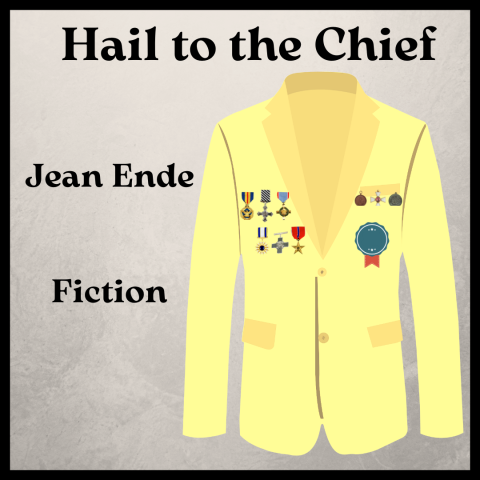Hail to the Chief

Image created onCanva
Grandma Leah’s medals were a major source of embarrassment to me. I wouldn’t have minded if they’d stayed in their special box, but Grandma believed that a person who had been awarded a medal had an obligation to let others know about it.
Once a week she’d take the medals out of the top drawer of the mahogany bureau in the room we shared. She’d carefully polish the silver and bronze bars and the ebony stars with a special soft cloth as she held each one up for me to admire.
I just nodded – even getting back to my homework was more interesting than the repeated story of their significance.
Every Monday, Wednesday and Friday at exactly 9:30 a.m. Grandma would stand in front of our large hallway mirror and carefully pin the medals to the left front pocket of her bright yellow cotton blazer. Then she’d march out the door and, her ample bust leading the way, strut down the street as fast as her bunioned feet could carry her.
“How ya doin’, general?” cried neighborhood children.
Adults smiled and saluted.
If people didn’t notice her adornments, Grandma pointed them out. She stopped at the benches that lined Pelham Parkway where properly behaved old ladies sat in the morning, tilting their wrinkled faces to the sun, sharing neighborhood gossip. “You’re just going to sit around all day and kvetch?” she said to them. “You think you’re going to get a medal for being the top yenta?”
She walked to the front of store lines. If anyone objected she pointed to her chest. “You know what that means?” They didn’t, but they were sufficiently intimidated not to object when she got served ahead of them.
***
Years ago, when my grandfather died, the candy store he and Grandma had managed was sold. One day she was getting up at dawn, taking two buses to the South Bronx and spending her time yelling at customers, suppliers, and my grandfather. The next day she had nothing to do.
After slogging through Depression-era poverty, my grandma resented the fact that my mother, her daughter, had an easy life. She glared at my mom’s dishwasher, informing anyone within hearing distance that a good wife wouldn’t mind cooking and cleaning for her family.
Now the only job she had was babysitting. My brother went to sleep early, we stayed up, watched TV and drank hot water, milk, and sugar. Grandma eased her substantial girth into the squishy green chair in the living room, a heating pad positioned against her lower back, and with multi-colored thread she planted elaborate gardens on stiff white linen tablecloths.
I sprawled on the plastic-covered yellow couch, a pudgy youngster with a drooping ponytail, stitching simplified versions of her design around the border of matching napkins. Every once in a while she checked my work, ripping out a section that contained a sloppily sewn leaf, or nodded in satisfaction if there were no mistakes.
On Monday nights we watched Grandma’s favorite show, wrestling. We sewed and ate and cheered for the grunting, sweating, elaborately costumed men as they mauled each other. Our favorite was the 300 pound Haystacks Calhoun who could lift and spin his nemesis over his head, the leopard-skin-clad Wild Man of Borneo, before throwing him to the ground.
“Give it to him, give it to him good!” yelled Grandma Leah without missing a stitch of the dainty embroidery. I knew she was waiting for the big splash finish when Haystacks climbed up the ropes and leaped onto his opponent. The ring shook, they crashed to the ground and the Wild Man cried out that he’d had enough.
Taking care of her grandchildren wasn’t enough activity for my grandmother and her idea of proper child raising techniques was very different from that of my mom.
“You’re spoiling Sarah and Stevie,” she said to my mother when my brother and I were allowed to leave the table without cleaning our plates. My mom shrugged. She was pleased our family didn’t have to scrimp, that her children weren’t being raised in the back of a candy store as she had been.
The constant arguing depressed everyone. So Grandma began to take long walks. She explored the other side of the parkway and one day wandered into Jacobi Hospital where she spotted a large sign soliciting volunteers. Grandma followed the arrows, spoke to a clerk and walked out wearing a yellow volunteer jacket, size XL.
Her first job was in the gift shop. After all, she had experience running a store. But this didn’t work out. Grandma kept rearranging the merchandise, changing the prices and interfering with customers and hospital personnel.
She told cleaning staff they weren’t working hard enough.
She told purchasers that the magazines they brought to the cash register were outdated, they should only buy the latest issues.
She told nurses they wore too much make-up and looked cheap.
She told Jewish interns to stop staring at the slutty shiksa nurses and find a nice Jewish girl.
She told medical students she had a beautiful granddaughter and gave them my number. She’d whisper that I came from a well-to-do family and she was sure her son-in-law wouldn’t mind pitching in on student loan payments.
Within a month, the Director of Volunteers paid my Grandma Leah a visit and explained that this placement didn’t seem to be going well. But Leah wasn’t ready to give up her new career. She’d discovered that working as a volunteer not only got her out of the house, it entitled her to a free lunch.
She had a cafeteria pass and could eat with the doctors. Without waiting for an invitation, or noticing looks of annoyance, she would sit down at a table full of medical personnel and recite her symptoms. (Of course she had symptoms, she was an old Jewish lady. It was her birthright.)
Then she would inquire about her tablemates. How often did they call home? Maybe they should call more often. What had led them to medicine? Would they call her grandson and convince him to pay closer attention to his studies so he could become a doctor? And, of course, would they like to see a picture of her granddaughter?
No one cared about the size of the portions that weighed down her tray. Grandma carried a large purse and filled it with empty Tupperware containers.
After eating, she emerged from the cafeteria with a few pieces of fruit, a danish, a sandwich and a serving of whatever goyische stew was on special that day. She added this food to our family pantry, where my mother ignored it and my grandmother savored the satisfaction of saving money.
Leah wasn’t ready to give up this largess. She asked the director for another chance, for a change of assignment. Anyway, after years of running a store she was tired of standing on her feet and dealing with the public. Wasn’t there somewhere quiet, more private, where she could work while seated?
Grandma wound up preparing items to be sterilized. She put tongue depressors, bandages, and similar items into small manila envelopes, stapled the envelopes shut and stamped on the date. Twice a day someone came by, chatted for a few minutes and picked up the envelopes. It was dull, mind-numbing work. She loved it.
At first, the Director thought my Grandma Leah might get lonely sitting by herself and would assign someone to help her do this job.
Grandma would show up and find another yellow clad volunteer sitting at her table. She wasn’t pleased. The other person would want to talk about people she didn’t know or care about, and they’d try to accompany Leah to the cafeteria and cramp her style. They also failed to meet her performance standards.
The other volunteers weren’t happy either. People volunteer at a hospital because they want to comfort the sick and make friends with hospital personnel, not to do piece work with a cranky old lady. They quickly requested the reassignments.
If they didn’t leave voluntarily, Leah took action. She marched into the director’s office, interrupting meetings and phone calls, waving a sheaf of tiny manila envelopes. “Look at this!” she demanded.
“This is my envelope. See, the staple is in the middle of the flap, the date is stamped at the very top where the doctor can find it easily. And now look at the envelopes that the other person worked on.”
She spread the deficient product on the director’s desk. “See, here, the staple is all the way on the left. And here it’s all the way on the right. And the date? It’s here and there and anywhere.”
Leah paused for breath and watched the director look at the envelopes. “You know as well as I do that we’re dealing with very sick people here. How can they get better with such shoddy treatment?”
The director got the message. The job had to be done, if Grandma wanted to do it that was fine. Otherwise the director would have to twist some other volunteer’s arm to do it, or, worse yet, the job would get assigned to someone who was getting paid.
The director agreed that no one else was up to Leah’s standards. She asked if Grandma would be willing to increase her hours and, in exchange, she would have the job all to herself. Grandma agreed to come three times a week. She owed it to the health of the people of Pelham Parkway. And this way she could visit the cafeteria more often.
A few weeks later, a messenger stopped at what Grandma now thought of as her office, with an invitation to the volunteers’ luncheon (free food served in the executive dining room) and the information that Grandma was to be among the honorees for her many hours of service.
She got a medal—a special gold bar that attached to her Red Cross pin. Six months later there was another luncheon, and another bar, this one had a star. The next bar had two stars.
At the end of each week, Grandma would remove the medals and carefully wash and iron her volunteer’s jacket so she’d be ready for her next shift. The bars were designed to be clipped beneath each other.
Grandma’s chain grew. She figured out how to pin the medals next to each other to cover more area. The medals made holes in the cotton jacket. Grandma lined the pocket with more durable material.
Grandma Leah worked at the hospital for seven years, retiring only when illness and senility forced her to give up the position. When she retired, the director wrote Grandma a note thanking her for her service. Leah was disappointed that there wasn’t a special medal attached to the note.
When she died, I asked my mom if she planned to have Grandma buried in her gold jacket, wearing her medals. My mother gave me a dirty look.
Anyway, Jewish funerals involve a closed casket and grandma would have been annoyed that no one could see the medals. I’m sure she’s happier to have them resting in my jewelry box, although she’s probably unhappy that I’ve never worn them or polished them with the special cloth that lines their box.
I offered the medals to my brother when he graduated from medical school but he wasn’t interested. He told me that the equipment was no longer prepared for the sterilizer by hand, that job was automated now.
Grandma Leah would probably say that means the hospital was unable to find anyone to do her job as well as she did and that no one ever pinned a medal on a machine.
Looking for more fiction? Check out these great works by MockingOwl contributors and staff.

Jean Ende
Jean Ende is a nice girl from the Bronx trying to exorcize her background by writing short stories about her immigrant family. Her stories have been published and recognized by a dozen publications and contests. She is a former newspaper reporter, corporate marketing executive, political publicist, and college professor. Jean is almost finished with her first novel and wishes it weren’t so hard to find an agent.





3 Comments
[…] Hail to the Chief […]
[…] Hail to the Chief […]
[…] Hail to the Chief – short fiction […]